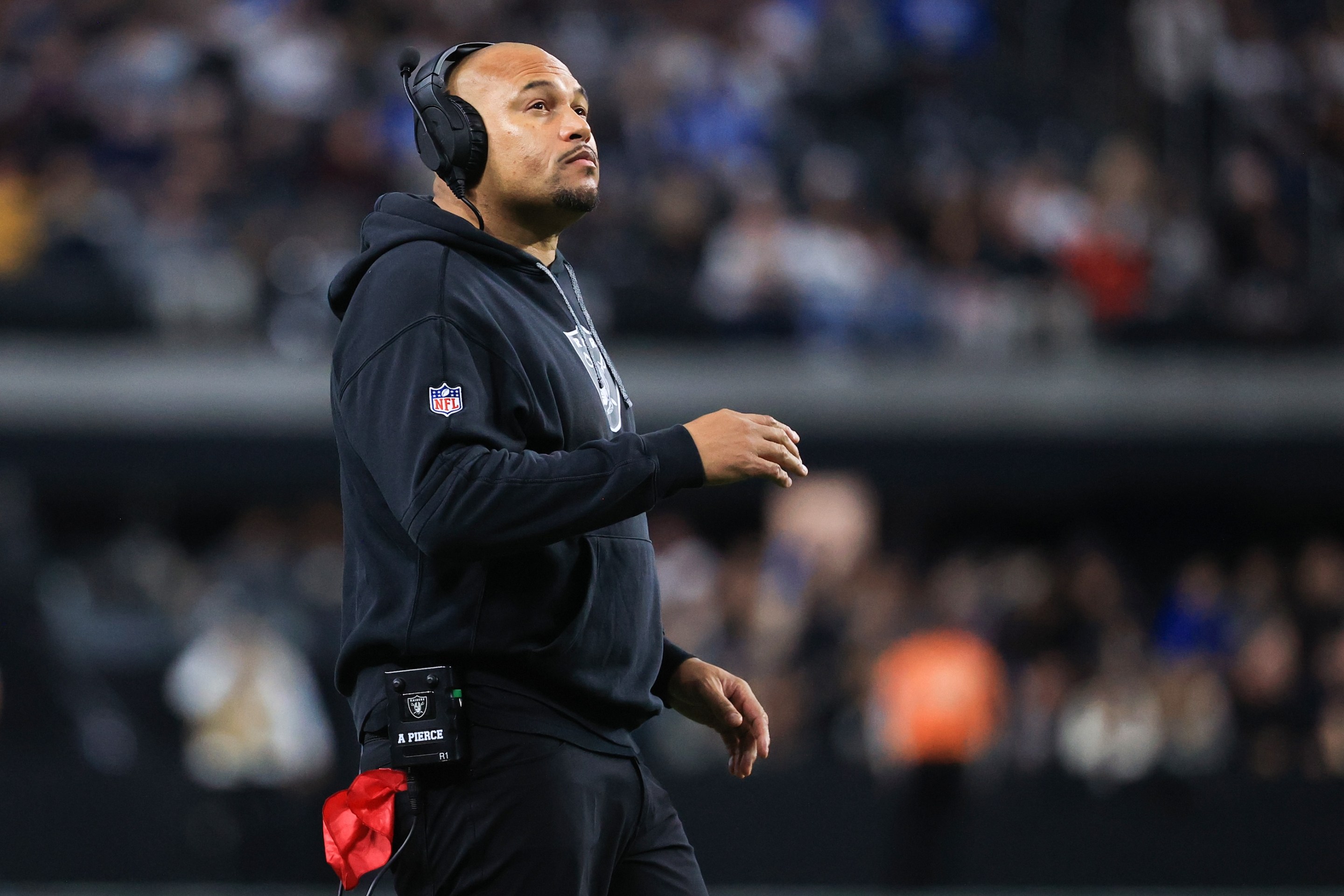In a sport that’s constantly morphing into strange new shapes as its decision-makers try and try to find the next big thing, the Las Vegas Raiders know what they like and like what they know. This doesn’t work, but it works for us—it’s why we can do a simple cut-and-paste on them and pass it off as fresh analysis. They make it that easy for us all.
Yep, the Raiders struck again, in the conservatory with the lead weight around their own ankles, just as they always do. There is one area and one area only in which they are the class of the NFL, and they do that work with such remarkable precision that nobody with any dignity takes pride in predicting what they'll do. It's not calling your shot when it happens every year.
On Tuesday, the Raiders fired coach Antonio Pierce after a 4-13 season and a coaching tenure of 26 entire games, which uncannily is one game (a loss, as it turns out) below the average Raiders coach's tenure over the 22 years since their last Super Bowl appearance. Pierce’s tenure of torture ended with one fewer migraine but the exact same result—a banker’s box for his stuff, a brief goodbye to whatever secretary didn't get the memo in time to clear the hallway, and one last slow walk of shame to the parking lot. No elaborate pejoratives are needed here. The word "Raiders" is proof if proof were needed.
This is who they are. This is what they do. This is what they always do. The Raiders are the past, present, and future tenses of the verb "suck" simultaneously, a generation's worth of dull gray helpless failure with a side of resigned despair around Hallowe'en, in all-you-can-eat portions at a joint that never closes or changes the menu or cleans the taps. The only thing that ever changes is the name of the guy who gets the blame two years later.
For any other team in any other sport, this sort of season would require some explanations. How did things go so badly so quickly? When did Pierce lose the plot, or the locker room, or the will to live? What could he have done differently, and to whom could he have done it? Was it Aidan O'Connell's fault, Gardner Minshew's fault, or Desmond Ridder's fault? What day is the draft? This is none of those things, because it never is. Pierce lost the job when he took the job, but more to the point he lost it at exactly the moment he was supposed to—after just shy of two full seasons. He was not set up to succeed, but he wasn’t really set up to fail, either. He was just named the head coach of the Raiders—the most interim job in sport.
What is remarkable, if "remarkable" is a word you can ever use with these guys, is how the Raiders seem to keep doing that thing they do in the same way, for something like the same amount of time, with the same crimes, the same clues, and the same plot twists all delivered in the same order. In a sport that reveres consistency, the Raiders are truly iconic. They are their own highlight film on an endless video loop that always ends in 1983. Law & Order is less formulaic.
The true hero here is gormless owner Mark Davis, whose own internal clock is totally atomic in that he always gives up on an idea before it has a chance to become old. We can jump anywhere into this long and recursive story and find the same story playing out. In this case, Pierce got the job because the players didn't want to play for Josh McDaniels (after 25 games, as it happens) and Pierce was already in the building. This allowed Davis to save airfare, time spent vetting candidates, and the requisite period of staff acclimatization. Paint a new name on the parking spot and they're good to go—in this case, good to go 4-13. It's a record they are accustomed to—this is the seventh time since that ill-fated Super Bowl that they’ve won only four games. See? They are who they are, and that's all that they are. Popeye the Sailor should sue for copyright infringement.
And this is how it shall continue. Davis doesn't do anything different, ever. It is as though he figures he was allowed one grand idea and one alone. His dad was that guy too—seizing on a philosophy that was perfect for the 1960s and 1970s and then never coming off it in the '80s, '90s or aughts, even as the game reconfigured itself several times over during that period. Mark's big idea was to rehire Jon Gruden after his dad had turned on him 17 years earlier; that lasted three years and 53 games, twice as long as Pierce, and left an email trail fit for a future Trump-appointed ambassador. Gruden now works for Barstool Sports while angling for a big coaching job that is never coming. On either side of Gruden are coaches who clung for a little while to the same short length of rope for not quite two seasons, and now Pierce is part of that legacy. When the Raiders say "win now," it is not aspirational—it's a threat.
Could Pierce coach? Who knows? Could he communicate? How could it matter when his first directive in charge was to tell the driver to wait in front with the engine running? He had his shot, and maybe he'll get another one at some point, though history suggests that the Raiders job is the last one anyone ever gets. It's as if everyone else in football knows what everyone else outside football knows—the Raiders are never not the Raiders. For this moment anyway, we who are supposed to explain their latest biennial implosion can at least be grateful for getting to knock off early.






